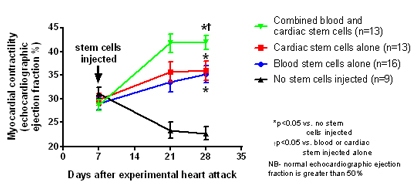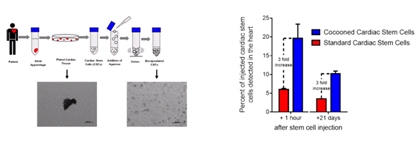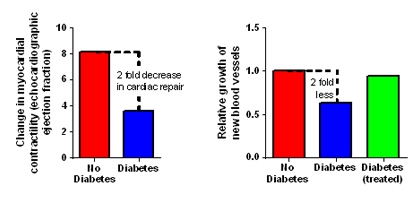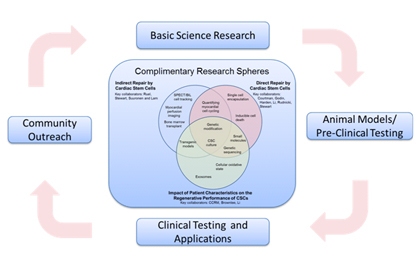On this page
Publications
See current publications list at PubMed
Selected Publications:
- Tilokee EL, Latham N, Jackson R, Mayfield AE, Ye B, Mount S, Lam BK, Suuronen EJ, Ruel M, Stewart DJ, Davis DR. Paracrine Engineering of Human Explant-Derived Cardiac Stem Cells to Over-Express Stromal-Cell Derived Factor 1? Enhances Myocardial Repair. Stem Cells. 2016 Apr 5. doi: 10.1002/stem.2373. [Epub ahead of print]
- Jackson R, Tilokee EL, Latham N, Mount S, Rafatian G, Strydhorst J, Ye B, Boodhwani M, Chan V, Ruel M, Ruddy TD, Suuronen EJ, Stewart DJ, Davis DR. Paracrine Engineering of Human Cardiac Stem Cells With Insulin-Like Growth Factor 1 Enhances Myocardial Repair. J Am Heart Assoc. 2015 Sep 11;4(9):e002104. doi: 10.1161/JAHA.115.002104.
- Molgat AS, Tilokee EL, Rafatian G, Vulesevic B, Ruel M, Milne R, Suuronen EJ, Davis DR. Hyperglycemia inhibits cardiac stem cell-mediated cardiac repair and angiogenic capacity. Circulation. 2014 Sep 9;130(11 Suppl 1):S70-6.
- Mayfield AE, Tilokee EL, Davis DR. Resident cardiac stem cells and their role in stem cell therapies for myocardial repair. Can J Cardiol. 2014 Nov;30(11):1288-98. doi: 10.1016/j.cjca.2014.03.018. Epub 2014 Mar 20. Review.
- Mayfield AE, Tilokee EL, Latham N, McNeill B, Lam BK, Ruel M, Suuronen EJ, Courtman DW, Stewart DJ, Davis DR. The effect of encapsulation of cardiac stem cells within matrix-enriched hydrogel capsules on cell survival, post-ischemic cell retention and cardiac function. Biomaterials. 2014 Jan;35(1):133-42. doi: 10.1016/j.biomaterials.2013.09.085. Epub 2013 Oct 4.
- Latham N, Ye B, Jackson R, Lam BK, Kuraitis D, Ruel M, Suuronen EJ, Stewart DJ, Davis DR. Human blood and cardiac stem cells synergize to enhance cardiac repair when cotransplanted into ischemic myocardium. Circulation. 2013 Sep 10;128(11 Suppl 1):S105-12. doi: 10.1161/CIRCULATIONAHA.112.000374.
- Tilokee EL, Davis DR. Circulating progenitor cells as a heart failure biomarker: does a failing marrow predict a failing heart? Can J Cardiol. 2013 Jun;29(6):662-3. doi: 10.1016/j.cjca.2012.09.011. Epub 2013 Jan 9.
- Davis DR, Ruckdeschel Smith R, Marbán E. Human cardiospheres are a source of stem cells with cardiomyogenic potential. Stem Cells. 2010 May;28(5):903-4. doi: 10.1002/stem.413.
- Davis DR, Kizana E, Terrovitis J, Barth AS, Zhang Y, Smith RR, Miake J, Marbán E. Isolation and expansion of functionally-competent cardiac progenitor cells directly from heart biopsies. J Mol Cell Cardiol. 2010 Aug;49(2):312-21. doi: 10.1016/j.yjmcc.2010.02.019. Epub 2010 Mar 4.
- Davis DR, Zhang Y, Smith RR, Cheng K, Terrovitis J, Malliaras K, Li TS, White A, Makkar R, Marbán E. Validation of the cardiosphere method to culture cardiac progenitor cells from myocardial tissue. PLoS One. 2009 Sep 25;4(9):e7195. doi: 10.1371/journal.pone.0007195.
Education
The Cardiac Translational Research Lab is funded by the Canadian Foundation for Innovation and Ontario Ministry of Research and Innovation to train High Quality People in translational medicine using state of the art infrastructure. These programs support trainees who seek to harness natural repair mechanisms to prevent and even reverse organ damage.
Educational Rounds
The Cardiac Translational Research Lab is situated in the University of Ottawa Heart Institute with access to educational opportunities within and outside the institute.
In addition, the Cardiac Translational Research Lab offers weekly rounds for trainees that include a:
- Stem Cell Journal Club that reviews recently published stem cell research papers,
- Landmark Journal Club that explores novel studies that form the basis for current cardiology research and
- Weekly rounds where students present recent findings to update the group, practice presentation skills and enable group problem solving.
The intent of these rounds is tailored for different levels of training to stress new learning objectives and research directions. For undergraduate basic science trainees, the goal of the program is to develop an understanding of basic cardiac stem cells biology and basic experimental techniques. For graduate and post graduate trainees, the educational goal is to develop a broad appreciation for the advantages/limitation of cardiac stem cells, an understanding of cutting edge experimental techniques, the ability to problem solve experimental results, the ability to present and discuss experimental results, and the ability to critically analyze their findings in the context of the prevailing literature.
Success for this approach is manifest by the multiple awards and publications by Cardiac Translational Research Lab students.
EDUCATIONAL POSITIONS
Stem Cell Research Internship
Our internship program will provide you with an opportunity to combine your hard earned book learning with some necessary real world experience in stem cell research. The Cardiac Translational Research Lab offers one of the most hands-on programs specifically designed to make use of the talent and motivation in every intern. We offer a multitude of exciting opportunities for our interns from molecular biology to clinical trials (and everything in between!).
Our internships are unpaid and for credit only. You will be asked to provide proof of enrolment at an accredited university and documentation that you will receive credit for the internship. All students are expected to assist with general lab procedures and to assist writing a review paper for publication. Positions generally require 20-40 hours/week.
Timeline: Our Summer program runs 12 weeks with the Fall and Spring programs being 15 weeks long. Resumes will be accepted and interviewing will begin 2-3 months prior to the start of the program.
- Summer Program: June – August recruiting begins March 1
- Fall Program: September – December recruiting begins June 1
- Spring Program: January – May recruiting begins October 1
Required Skills:
- Good planning and personnel management skills.
- Interpersonal skills and ability to interact and work with staff at all levels.
- Excellent written and oral communication skills.
- Ability to wrking independently and in a team environment.
- Ability to pay attention to details.
- Willingness to take initiative and to follow through on projects.
How to apply: Forward a copy of your CV, letter of intent, provide proof of enrolment at an accredited university, documentation that you will receive credit for the internship and official University transcript to the Cardiac Translational Research Lab.
Undergraduate COOP Student Job Placements
In collaboration with the University of Ottawa Co-operative Education Program, the Cardiac Translational Research Lab offers 1 exceptional University of Ottawa undergraduate science student the opportunity for real world experience in stem cell research per school term. All COOP students are given their own research project that provides the opportunity to learn the fundamental and experimental techniques needed to complete the research question. In addition all students are expected to participate in the maintenance of clinical databases and general lab procedures.
COOP positions are paid with ongoing support by University of Ottawa Co-operative Education Work Study program. Positions generally require 20-40 hours/week.
Required Skills:
- Good project management and planning skills.
- Good personnel management skills.
- Interpersonal skills and ability to interact and work with staff at all levels.
- Excellent written and oral communication skills.
- Working independently and in a team environment.
- Ability to pay attention to details.
- Willingness to take initiative and to follow through on projects.
- How to apply: Applications are made through the University of Ottawa Co-operative Education.
Undergraduate Honours Student Research
Undergraduate honours student research provides positions through courses offered to final year students in the Biomedical and Biopharmaceutical Sciences program of the Faculty of Science at the University of Ottawa. These are highly competitive positions that provide 1-2 exceptional undergraduate final year students at University of Ottawa the opportunity to do research in stem cell biology.
Undergraduate Honours Research Projects are unpaid and for credit at the University of Ottawa only. All students are given their own research project that provides the opportunity to learn the fundamental and experimental techniques needed to complete the research question.
Required Skills:
- Good project management and planning skills.
- Good personnel management skills.
- Interpersonal skills and ability to interact and work with staff at all levels.
- Excellent written and oral communication skills.
- Working independently and in a team environment.
- Ability to pay attention to details.
- Willingness to take initiative and to follow through on projects.
How to apply: Students must register for the BIM/BPS courses. Forward a copy of your CV, letter of intent (http://www.wikihow.com/Write-a-Letter-of-Intent) and official University transcript to the Cardiac Translational Research Lab (@email) with the subject “Honours student application”.
Graduate Students
The Cardiac Translational Research Lab is affiliated with the University of Ottawa Department of Cellular and Molecular Medicine. The objective of graduate programs leading to the degrees of Master of Science (MSc) and Doctor of philosophy (PhD) in cellular and molecular medicine is to prepare candidates for a career in university teaching and research. During training, the student will develop a critical approach to published work and to their own work. Graduates acquire an excellent knowledge of their chosen field and a general understanding of the areas related to their own particular research project. They must demonstrate research skills and credibility as professionals in their area of research.
MSc. and PhD students are paid but must be registered with the University of Ottawa. All students are given their own research project that provides the opportunity to learn the fundamental and experimental techniques needed to complete the research question.
Required Skills:
- Excellent project management and planning skills.
- Excellent personnel management skills.
- Interpersonal skills and ability to interact and work with staff at all levels.
- Excellent written and oral communication skills.
- Working independently and in a team environment.
- Ability to pay attention to details.
Admission to the graduate program in Cellular and Molecular Medicine is governed by the general regulations of the FGPS and students should review the guidelines provided by CMM. Once accepted to the program, students should contact the Cardiac Translational Research Lab with the subject “Graduate student application”.
Postdoctoral Fellowship
Postdoctoral fellowship positions are offered through the University of Ottawa Faculty of Graduate and Postdoctoral Studies. The lab very much encourages post-doctoral fellow applications from individuals with relevant experience in cell culture and molecular biology. During training, post-doctoral fellows will develop a critical approach to published work and to their own work. They will be given the opportunity to teach and supervise all levels of trainees. Graduates acquire an excellent knowledge in translational biology and a general understanding of the areas related to their own particular research project. They must demonstrate research skills and credibility as professionals in their area of research.
Required Skills:
- Relevant training in cellular and molecular biology.
- Demonstrated ability to publish in high quality journals.
- Excellent project management and planning skills.
- Excellent personnel management skills.
- Interpersonal skills and ability to interact and work with staff at all levels.
- Excellent written and oral communication skills.
- Working independently and in a team environment.
- Ability to pay attention to details.
Interested applicants should contact the Cardiac Translational Research Lab with the subject “Post-doctoral fellow application”. Forward a copy of your CV, letter of intent and official University transcript to the Cardiac Translational Research Lab.
Focus
Heart failure is a growing epidemic. While medical advances help people live longer, the number of patients with heart failure is increasing at a staggering rate. Currently over 400,000 Canadians are living with heart failure – but many won’t survive for long. Heart failure is also the most serious killer in cardiovascular diseases, claiming more lives than lung cancer, stroke, AIDs and breast cancer combined.
Our lab focuses upon exploring new ways to repair these broken hearts. As such, we have developed techniques to re-implant a patient’s own heart stem cells into these damaged areas.
This research has provided the following highlights:
- In 2009, we cultured the very first human cardiac stem cells in Canada (Mayfield et al., Can. J Cardiol. 2014).

- We are also busy studying the ability of both blood and heart stem cells to strengthen the heart. In 2013, we published the first evidence that combination delivery of the two leading stem cell sources for cardiac repair provide additive benefits (Latham et al., Circulation 2013). As shown below, this work is promising and will be the focus of an upcoming clinical trial currently under review (COMBAT-AMI).

- Akin to other types of stem cells injected into perfused beating hearts, our stem cells have difficulty engrafting and growing into new working heart tissue. To address this pressing need, we have developed a technique to surround cells in a protective cocoon prior to injection (Mayfield et al., Biomaterials 2014). This cocoon immediately increases the retention of injected cells and provides these transplanted cells the opportunity to survive and grow into heart tissue.

- We have also shown that the regenerative performance of cardiac stem cells is influenced by medical illness. In a recent study, we demonstrated that long-term uncontrolled diabetes (HbA1c greater than 7.0) greatly limits the ability of cardiac stem cells to repair injured hearts (Molgat et al., Circulation 2014). When the ability of cardiac stem cells to handle glucose is improved, we have shown this restores the ability of cardiac stem cells to promote new blood vessel growth.

We anticipate that this research will help to treat Canadians who suffer from chronic heart failure. With these improved therapies there is the potential to extend the lives of Canadians by preventing some of the 45,000 deaths each year caused by heart failure.
Projects
The lab is well positioned to leverage our platform technologies within regenerative medicine. Investigations range from the molecular to the multicellular level with extensive cross-fertilization among projects. This work is made possible through close collaborations within the University of Ottawa Heart Institute (Regenerative Therapies Lab and Inherited Arrhythmia Research Lab) and without (Sprott Centre for Stem Cell Research, Ottawa Hospital Research Institute, Montreal Heart Institute and University of Toronto).
Congestive heart failure is a major health care burden, affecting over 71 million adults (43 million under age 65) in North America, with over 71,000 deaths annually in Canada alone at a cost of over 22 billion dollars to the Canadian economy. These numbers are expected to increase in the coming years given an aging population and advances in other domains of cardiovascular disease.
The strategy of transplanting stem cells into damaged myocardium has emerged as a novel alternative to organ transplantation and ventricular assist devices in the treatment of heart failure. Ideal graft cells should be autologous, easy to expand in vitro, able to engraft and differentiate into functional cardiac myocytes that couple electromechanically with the surrounding myocardium.
We have shown that distinct subpopulations of cardiac stem cells (CSCs) may be isolated directly from cardiac tissue. This advance was based upon studies from the neural literature whereby neural stem cells can be expanded as self-assembling spherical aggregates, termed neurospheres. Our technique simplifies culture methods by focusing on the primary product that is the initial cellular outgrowth from cardiac samples, without recourse to antigenic sub-selection or sphere expansion.
When samples of minced cardiac tissue are cultured, a lawn of flat cells emigrates spontaneously from the plated cardiac tissue. Within that lawn, clusters of CSCs emerge and proliferate. Using mild enzymatic dissociation, loosely-adherent cells surrounding the explant (termed cardiac outgrowth) can be serially harvested. Flow cytometry of these serial collections demonstrate that this spontaneous cardiac outgrowth is enriched, as compared to the native heart, for sub-populations that antigenically resemble CSCs (abcg2+, c-Kit+ and SSEA-1+), endothelial cells (CD31+, CD34+) and mesenchymal cells (CD90+).
When injected into the ventricle of adult Wistar Kyoto rats at the time of left anterior descending (LAD) artery ligation, hearts treated with cardiac outgrowth had reduced ventricular dilation and greater systolic thickening 3 and 6 weeks after myocardial infarction. Invasive hemodynamics performed 6 weeks after myocardial infarction demonstrated lower left ventricular end diastolic pressure and greater maximal contractile element velocity in animals treated with cardiac outgrowth than animals treated with dermal fibroblasts or saline. Histology revealed elongated myocytes derived from injected cells at the border or the endocardial aspect of the infarct. Within the infarct region itself, cardiac outgrowth cells formed discrete clusters of spherical cells surrounded by fibrous tissue.
Recent studies examining the expanded progeny of cardiac outgrowth have demonstrated that in vivo these cells secrete vascular endothelial growth factor, heptocyte growth factor and insulin-like growth factor-1. The direct contribution of these cells to cardiac tissue represents approximately 20 to 50% of the overall increase in capillary and cardiomyocyte densities, suggesting that indirect effects on tissue preservation and/or recruitment of endogenous progenitors significantly contribute to therapeutic outcomes.
Thus the direct outgrowth from cardiac samples provides a promising autologous source of cells that permits ex-vivo amplification, followed by delivery to areas of injury, where they engraft and regenerate the heart.
Projects within the lab are directed towards:
Maximizing the direct CSC transdifferentiation into working myocytes,
Increasing indirect paracrine mediated repair and
Limiting the impact of patient characteristics on CSC regenerative performance.



